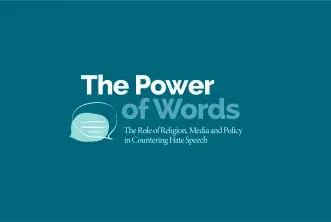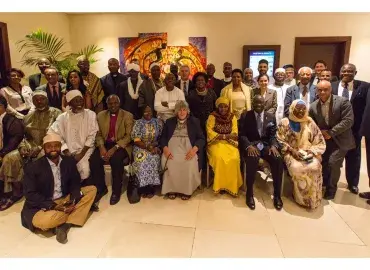Around the world, hate speech is on the rise, and the language of exclusion and marginalisation has crept into media coverage, online platforms and national policies. Communities are facing problematic levels of intolerance – including rising anti-Semitism and Islamophobia, as well as the hatred and persecution of Christians and other religious groups. In the public arena, discourse has been weaponised for political gain with hostile rhetoric directed at minorities, migrants, refugees, women and the so-called “Other”. Hate speech weakens and destroys communities, sowing seeds of fear, hatred and distrust. When left unchecked it can lead to violence and even help set conditions for genocide.
The International Dialogue Centre (KAICIID) believes hate speech requires a coordinated response from religious leaders, policymakers, journalists and the general public – both to address the main drivers of hate speech and to provide a coordinated response which upholds the fundamental rights and inclusion of all communities and individuals.
What is hate speech and how does it incite violence?
While there is no exact legal definition of “hate speech”, it is generally defined by the United Nations as, "any kind of communication in speech, writing or behaviour, that attacks or uses pejorative or discriminatory language with reference to a person or a group on the basis of who they are, in other words, based on their religion, ethnicity, nationality, race, colour, descent, gender or other identity factor." When left unaddressed it can lead to violence or hate crimes against marginalised groups. While some statements may not immediately incite violence, they can spread seeds of intolerance and anger that lead to legitimising acts of hate.
For acts of incitement to result in violence, the following elements need to be present: a context conducive to violence, an influential speaker, a speech act that is widely disseminated, a receptive audience and a target (typically marginalised groups).
An act constitutes incitement to violence when there is intent on the part of the speaker to advocate or cause violence. There also needs to be a likelihood that the act may result in violence. Therefore, while all incitement to discrimination, hostility or violence is hate speech, not all hate speech constitutes incitement.
What is freedom of expression?
Freedom of expression is protected under international law, with clear rights outlined in Article 19 of the Universal Declaration of Human Rights (UDHR) and the International Covenant on Civil and Political Rights (ICCPR).
However, the international community has also agreed to certain limitations – such as on speech which advocates “national, racial or religious hatred” and “constitutes incitement to discrimination, hostility or violence.” Therefore, it is extremely important for governments to establish sound legal frameworks on hate speech which hold perpetrators accountable, uphold human dignity, protect marginalised groups, while still balancing the right to freedom of expression.
Religion as a target of and solution to hate
Between 2007-2019, the Pew Research Center reported a significant increase in social hostilities involving religion – including violence and harassment by private individuals, organizations or groups.
This increase has been particularly clear in Europe and the Middle East-North Africa (MENA) region. In 2007, Pew documented reports from six countries in Europe with incidents of “assault on individuals for religious expression that was considered violent or threatening”. Ten years later, that number had risen to 25 countries (out of a total of 45 countries in Europe). Reported incidents included attacks and slurs against Jewish and Muslim communities.
During this same time period, MENA experienced higher levels of official harassment of religious groups compared with other regions around the world. This category measures types of harassment ranging from violence and intimidation to verbal denunciations of religious groups and formal bans on certain groups.
Religious leaders are instrumental in combatting hate speech and discrimination, particularly since these actions undermine the values of religious diversity and pluralism. Unfortunately, religion has sometimes been misused to justify hostility and incitement to violence. It is vital that religious leaders from all faiths show leadership and set a strong example for their followers.
Because religious leaders and organizations are actively engaged with local communities, they are well-positioned to serve as early warning and response (EWER) mechanisms and alert authorities to the escalation of intercommunal tensions. More efforts need to be made to involved religious leaders in EWER structures and to work with government officials on a coordinated strategic response.
Countering and preventing hate speech
While government authorities have the primary responsibility to prevent incitement and protect their people from atrocity crimes, it is up to everyone to stop hate speech and the violence it enables and encourages.
There are many ways to counter and prevent hate speech. These include:
- Raising awareness through community-held trainings or educating friends and family on the dangers of discrimination and intolerance
- Reporting social media posts which spread rumours or misinformation
- Boosting positive messages of peace and tolerance on social media and online platforms
- Supporting individuals or groups who are targeted by hate speech and encouraging policymakers to take action against discriminatory language or policies
- Hosting workshops on conflict sensitive journalism in order to help journalists develop the ethical capacities to identify sources of conflict, and to report news fairly and accurately
- Forming early warning and early response committees at the national and local levels to monitor hate speech and other forms of incitement to violence
“The words of a human being have tremendous power, to build and destroy, to give life and to take life. In Abrahamic religions…
The African continent bears witness to the tragic consequences of the manipulation of religion to incite violence. Yet it is…
VIENNA, 28 October 2019 - More than 190 international delegates and guests, among them Heinz Fischer, former President of…





